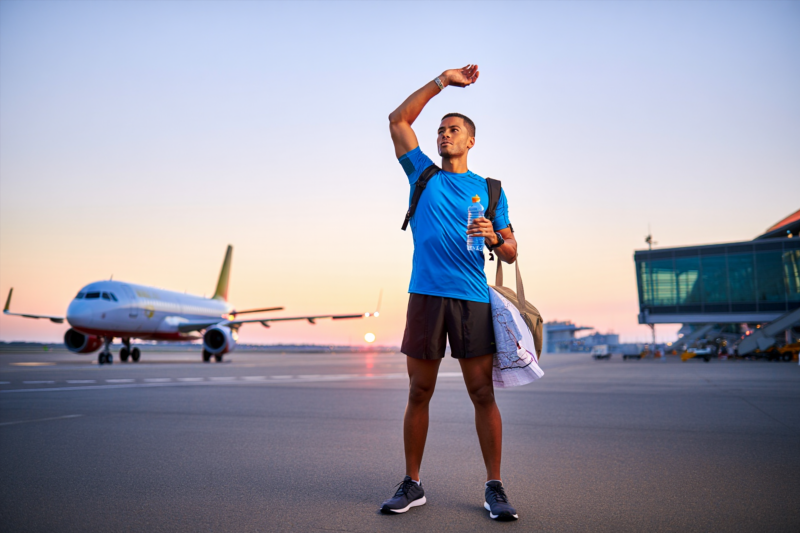
How Travel and Time Zones Affect Race Performance Tips
Travel and time zone changes are often overlooked factors that can significantly impact athletic performance on race day. Whether you’re heading international for a marathon or domestically for a triathlon, understanding how these variables influence your body can make the difference between a personal best and a disappointing result. This guide explores the science behind travel fatigue, jet lag, and adjustment strategies with expert tips to help you perform at your peak despite the challenges of travel.
The Impact of Travel and Time Zones on Race Day Performance
How Travel Affects Your Body
Travel introduces various stresses—physical, mental, and physiological—that can disrupt your normal routine:
- Physical Fatigue: Long flights, driving, or train journeys drain your energy.
- Sleep Disruption: Changes in time zones and travel schedules can result in poor sleep quality.
- Hydration and Nutrition Challenges: Limited access to your usual diet and water intake during travel affects energy levels.
- Stress: Navigating airports, security, language barriers, or unfamiliar environments increases stress, which can impair focus and physical readiness.
The Role of Time Zone Changes and Jet Lag
Jet lag results from your internal circadian rhythms being misaligned with the local environment, leading to:
- Fatigue and Sleep Disturbances: Difficulty falling asleep or waking up at appropriate times.
- Reduced alertness and focus: Critical for maintaining proper pacing during races.
- Decreased endurance and strength: Due to disrupted hormonal balances and sleep deprivation.
Expert insight: Athletes often notice a drop in performance if they do not adapt quickly to new time zones, especially when races are scheduled soon after travel.
Tips to Effectively Adjust and Optimize Race Performance
Pre-Travel Preparation
- Start Adjusting Before Departure: Shift your sleeping and eating schedule closer to the destination’s local time 2-3 days ahead.
- Stay Hydrated: Begin hydration routines early and maintain them during travel.
- Plan Nutrition: Stick to familiar, nutrient-dense foods that support energy and recovery.
During Travel
- Manage Sleep as Much as Possible: Use eye masks and earplugs; consider a sleep aid if approved by your doctor.
- Stay Active: Simple stretches or walking during layovers can promote circulation and reduce stiffness.
- Hydrate Thoroughly: Avoid caffeine and alcohol, which can dehydrate you further.
- Use Light to Your Advantage: Seek natural light during the day to help reset your internal clock.
Post-Arrival and Leading Up to Race Day
- Prioritize Sleep: Aim for at least 7-9 hours of quality rest per night.
- Adjust Meal Times: Synchronize your eating schedule with local time.
- Incorporate Light Exercise: Light runs or stretching to adapt to the new environment and boost circulation.
- Use Melatonin Supplements: Under medical supervision, melatonin can help reset your circadian rhythm.
Additional Strategies for Race Day Success
| Strategy | Explanation | Why It Helps |
| Proper Hydration | Continue drinking water before and during the race | Prevents dehydration, which impairs performance |
| Consistent Nutrition | Consume familiar, energy-boosting foods | Keeps blood sugar stable and maintains energy levels |
| Stay Calm and Mindful | Use relaxation techniques such as deep breathing | Reduces stress, which can worsen jet lag effects |
| Pacing and Mental Preparation | Focus on steady pacing and positive visualization | Overcomes fatigue and maintains motivation amid travel fatigue |
Frequently Asked Questions
How long does it take to recover from jet lag for a race?
- Generally, it takes about 1 day per time zone crossed to recover. Starting adjustment pre-travel can shorten this period.
Should I consider taking melatonin before a race in a new time zone?
- Consult your healthcare provider, but melatonin can be effective for resetting your internal clock if used appropriately.
Can I entirely avoid jet lag if I arrive early?
- Arriving at least 2-3 days early can significantly reduce the effects, allowing your body to adapt more fully before race day.
What if I can’t arrive early due to scheduling constraints?
- Focus on maximizing sleep quality, hydration, and light exposure as outlined above. Consider a professional consultation for personalized strategies.
Travel and time zone changes are unavoidable for many athletes aiming for excellence. However, with deliberate preparation and effective adjustment techniques, you can minimize their negative effects. Implement these expert tips—like pre-travel schedule adjustments, strategic light exposure, and optimal hydration—and give yourself the best shot at achieving your race goals regardless of travel distance.
Remember: Your ability to adapt swiftly improves your chances of performing at your absolute best. Start planning today to turn travel challenges into opportunities for victory!